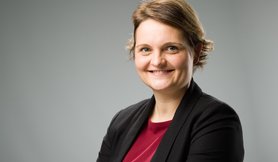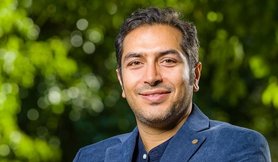![[Translate to English:] Postdoc Dr. Fouad Bahrpeyma](/fileadmin/_processed_/4/e/csm_20211104_Bahrpeyma-mini_7d39928a4a.jpg)
With drive and international aspirations
Dr. Fouad Bahrpeyma starts in the postdoc program at HTW Dresden
Since September, Dr. Fouad Bahrpeyma is part of the research team around Artificial Intelligence and Cognitive Production Systems at the Faculty of Computer Science/Mathematics at HTW Dresden. As part of the postdoc program, the scientist will expand his expertise in research and teaching in the coming years to prepare for a future career in higher education. He will be supported by his mentor Professor Dirk Reichelt.
Mr. Bahrpeyma, what topics and tasks will you be working on as a postdoc at HTW Dresden over the next few years?
As a postdoc at the Faculty of Computer Science/Mathematics, I am responsible for research in the area of cognitive production systems. Here, I will try to raise more funds and start new projects. Furthermore, I support students (as well as MSc and PhD students) in developing their academic-scientific skills and writing publications and scientific papers.
Special focus in my work will be on developing advanced intelligent systems for automation, where heterogeneous components and data sources are monitored and controlled in an autonomous way within a unified architecture.
An example of such systems is a production line with a variety of machines presenting different functionalities and capabilities. My task would be to develop an autonomous production system which is able to automatically reconfigure itself for producing a new product for an optimal production process. Another example would be the self-recovery property, e.g. when any parts of the production line stop working due to any reasons, then the production system will be able to change the path, reconfigure itself and assemble a new production procedure.
What did you do before you started working at HTW Dresden?
Before I started as a postdoc at HTW Dresden, I was already a postdoc at the Insight Centre for Data Analytics at Dublin City University in Ireland. There, my main area of expertise was Artificial Intelligence with a particular focus on intelligent self-organizing and self-adaptive systems. My interest in this started in 2012 when I was working on my Master's thesis. In order to develop a self-organizing resource provisioning framework for large-scale cloud systems, I needed to explore different concepts from Artificial Intelligence and adaptive control. I then turned to time series analysis during my PhD at Dublin City University.
How did you get involved with the university?
I came across the advertisement for the postdoctoral position in Prof. Reichelt's project on LinkedIn. Before that, I had already become aware of the fascinating activities in the IOT test lab and Professor Reichelt's ambitious research projects.
What do you hope to achieve as a postdoc?
My goal is to use the latest developments in IOT technology to further expand my and HTW Dresden's research in the field of intelligent systems and to develop high-performance, cognitive production systems. Of course, I would also like to get more involved in teaching and expand my teaching skills. Here I have already received a lot of support from Professor Reichelt, my team members and faculty colleagues.
For me personally, I hope to expand my academic skills to be able to work as a professor at a German university in the future. Furthermore, during my postdoctoral qualification I would like to expand my professional network in the academic and industrial field throughout Germany and internationally. It is desirable that this will enable me to present the potentials and competencies of HTW Dresden to a more diverse audience.
Is there anything you would like to achieve here?
HTW Dresden offers great potential - especially in the field of IOT research. I would like to use the existing capacities to further integrate cognitive science and artificial intelligence into intelligent production systems. My goal is to establish a broader range of topics and thus realize international and industry-based collaborations.
We wish you a successful time at HTW Dresden!
The Postdoc Program at HTW Dresden
With the Postdoc Program, HTW Dresden supports highly talented young scientists who have completed their doctorate. The goal is to attract them to research and teaching and to qualify them for a professorship or permanent scientific position at a university of applied sciences (HAW). Within five years, postdocs go through two qualification phases that include aspects of teaching and research as well as personal development. Successful graduates receive the "HAW-Postdocplus" certificate. Currently, there are five postdocs at HTW Dresden.
Weitere Dokumente/ Antragsformulare finden Sie hier: https://www.htw-dresden.de/en/hochschule/aktuelles/translate-to-english-news
Contact



